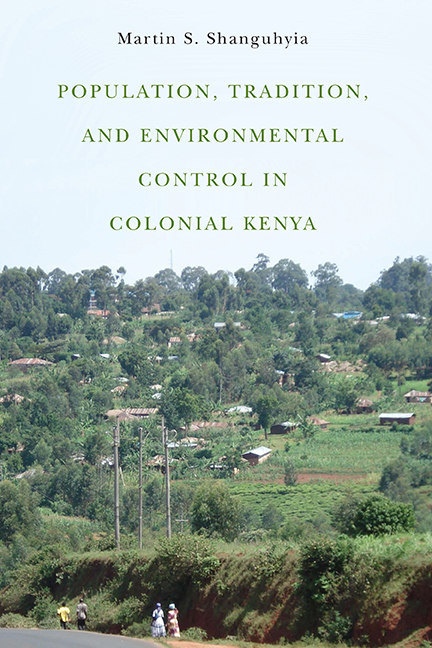Book contents
- Frontmatter
- Contents
- List of Illustrations
- Preface
- Abbreviations
- Introduction
- 1 Administrative and Demographic Changes: Implications on Land Relations, 1900–1930
- 2 Maize and Economic Prosperity, 1920–38
- 3 Internationalizing Degradation Narratives in Kenya, 1930–38
- 4 Prewar Soil Conservation Initiatives and Local Responses, 1934–38
- 5 Wartime Production in a Besieged Environment, 1939–45
- 6 Postwar Development and the Dilemma of “Reviving” African Traditions, 1945–63
- 7 Regional Migration and Failed Agricultural Intensification, 1940–66
- Conclusion
- Notes
- Bibliography
- Index
1 - Administrative and Demographic Changes: Implications on Land Relations, 1900–1930
Published online by Cambridge University Press: 09 June 2021
- Frontmatter
- Contents
- List of Illustrations
- Preface
- Abbreviations
- Introduction
- 1 Administrative and Demographic Changes: Implications on Land Relations, 1900–1930
- 2 Maize and Economic Prosperity, 1920–38
- 3 Internationalizing Degradation Narratives in Kenya, 1930–38
- 4 Prewar Soil Conservation Initiatives and Local Responses, 1934–38
- 5 Wartime Production in a Besieged Environment, 1939–45
- 6 Postwar Development and the Dilemma of “Reviving” African Traditions, 1945–63
- 7 Regional Migration and Failed Agricultural Intensification, 1940–66
- Conclusion
- Notes
- Bibliography
- Index
Summary
Introduction
The beginning of the twentieth century was an important time for communities that constituted the area that evolved into the Kenya Colony. It marked the establishment of British colonial rule, which proceeded at a gradual pace from the Indian Ocean coast toward western Kenya. For communities in Vihiga and other parts of Kenya, establishment of colonial control unleashed dramatic changes, although some continuity in local systems and values was also evident. These processes were obvious in the administrative and agrarian sectors, as changes in both arenas had huge implications on the land relations that emerged between the colonial state and the local communities.
The establishment of the colonial state also altered the local indigenous power structure, a development that helped to shape colonial relations over land. Perhaps more critical for Vihiga were demographic trends and their impact on emerging colonial politics over access to and use of land in the period leading up to 1930. Through an analysis of these early developments, this chapter reveals that land was a highly politicized resource in colonial western Kenya and demystifies the dominant view that land issues in colonial Kenya were a major factor in shaping the colony's political, economic, and social trends only in Central and Rift Valley regions where massive land alienation for European settlement was prevalent.
Early Colonial Administrative Developments
At the time of expansion of British colonial rule into western Kenya in the late nineteenth and early twentieth centuries, the Abaluyia community consisted of about seventeen independent ethnic groups that were related by a common ancestral lineage. For each of these communities, political and judicial power rested with certain clan heads. Only the Wanga community, inhabiting the central-western part of Abaluyialand exhibited a highly unified political structure, with the nabongo (king) at the head, based at Mumias. Naturally, therefore, early British colonial officials turned to Wanga leadership to forcibly conquer or coerce the rest of the Abaluyia ethnic groups into colonial submission. The British reciprocated by slotting Wanga traditional agents into the budding colonial administrative structure across numerous Abaluyia locations, outside of Wanga Kingdom. Also the nabongo was recognized as the “supreme chief,” and therefore “spokesman,” of all Abaluyia communities. This arrangement ensured that the Wanga played an important role in advancing British control over several communities in western Kenya.
- Type
- Chapter
- Information
- Publisher: Boydell & BrewerPrint publication year: 2015



